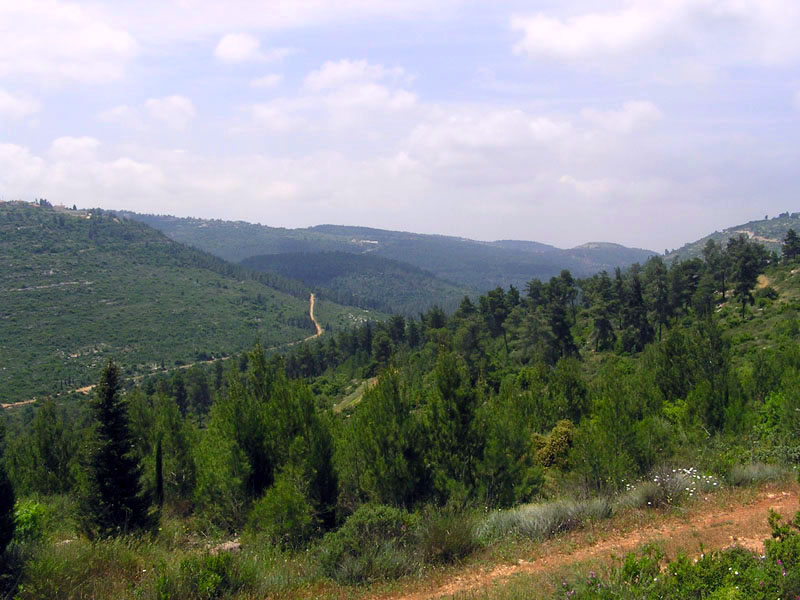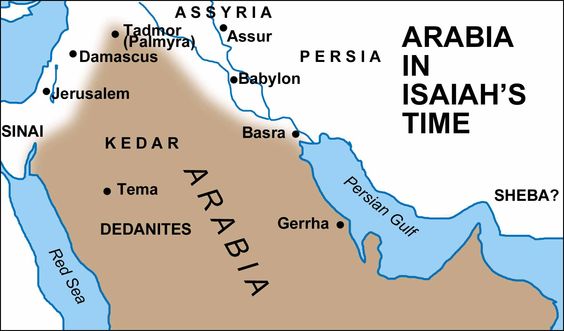Blog
Bulletin Articles
Summaries, Psalm 131-135
Monday, December 09, 2019
Psalm 131, another Song of Ascents, compares our relationship with God to a small child snuggling with his mother. Just like that child is calm and at peace, so our soul isn’t disturbed within us. Just like the child doesn’t worry because he trusts his mother, we don’t worry because we trust God.
Psalm 132 compares the pilgrim’s zeal for the temple to David’s zeal for the temple. The psalmist begins by observing that even though David didn’t build the temple, he very badly wanted to, and indeed vowed that he wouldn’t sleep until he began the project. Similarly, the pilgrims have resolved to go to the temple, where they ask God to be present and sanctify His people.
After this, the psalmist returns to the subject of David, noting that God promised him that his descendants would reign forever so long as they remained faithful to Him. As a consequence of this oath, God has chosen to dwell in and protect Zion. There, God will bless His people and confirm David’s descendant as king.
Psalm 133 reflects on the subject of unity. It describes unity as a good and pleasant thing, and it compares it both to the priestly anointing oil that was poured abundantly on Aaron and to the dew that fell on Mt. Hermon. In both cases, the message is clear: unity is a blessing that God pours on us from above.
Psalm 134 is one of the shortest psalms in the book. It’s addressed to the night watchmen in the temple. It urges them to bless the Lord and in turn expresses the wish that the Lord would bless them.
Psalm 135 is the final Song of Ascents. It calls all of God’s servants to praise Him. God should be praised because praising Him is pleasant and because He has chosen Israel to be His people. The psalmist then explores the power of God, observing that He does whatever He pleases. Incidentally, doing whatever one pleases is the Biblical definition of omnipotence, and it avoids the hypotheticals of the skeptics like, “Can God create a rock too big for Him to lift?” (A better question would be, “Why would God be divided against Himself?”)
The psalm then enumerates various works of God, from controlling the weather to delivering Israel from Egypt to conquering Israel’s enemies in Canaan. Because of this, God’s fame is worldwide, and His servants can be confident that He will continue to bless them.
By contrast, the idols of the nations are mute, powerless, and lifeless. As a result, they won’t deliver anybody, and those who trust them will become mute, powerless, and lifeless too. The psalm concludes with inviting various portions of God’s people to bless and praise Him.
Summaries, Psalms 126-130
Monday, December 02, 2019
Psalm 126, like all the other psalms in this week’s reading, is a Song of Ascents—a psalm that Jewish pilgrims sang as they went up to Jerusalem. The second half of the opening line of this psalm is rendered quite differently in different translations. The ESV has “restored the fortunes of Zion”; the NASB, “brought back the captive ones of Zion”. The literal Hebrew here is “captivity”, but sometimes in Scripture it is used metaphorically of restoring fortune, as in Job 42:10.
Regardless of which translation approach is adopted, the meaning is clear. This is a psalm about the return of the captives to Judah after the Babylonian Captivity. The Jews were astounded, and all the nations around them remarked on God’s blessing for them. The psalm concludes with a prayer for further blessing, so that the people who now weep as they sow will rejoice several months from now during the time of the harvest.
Psalm 127 remarks on the futility of life without God and the blessing of living with Him. It observes that without His help, neither the work of the builder nor the watchman will be successful. Faithless people live anxious lives, but the faithful enjoy pleasant rest because of the peace He gives.
The psalm concludes with discussion of one of God’s greatest blessings—children. Just as a warrior with many arrows could be confident, so too could an Israelite with many children. Because they had their children to rely on, they didn’t have to be afraid of their enemies in the village.
Psalm 128 continues the theme of God’s blessing upon the faithful. Those who fear the Lord will be able to provide for themselves and enjoy His care through their lives. Their wives will be fertile, and they’ll have many children (the “olive shoots” imagery is basically about a bunch of suckers growing from the roots and base of an olive tree). The psalm concludes with an exchange of blessings—for prosperity in Jerusalem, for long life, and for peace.
Psalm 129 is a plea for God’s help and justice. It begins with the personified nation of Israel complaining about how others have afflicted him. The “plowing furrows” on the back of Israel in v. 3 is probably about the scars left by whipping a slave. However, Israel has been released from captivity and now looks for God to punish his oppressors. He asks God to make their prosperity like the grass that grows on a thatched roof (in our case, we might think of maple seeds sprouting in gutters). It looks green for a little while, but it soon dries out, doesn’t offer anything for anyone to harvest, and doesn’t attract blessing.
Psalm 130 is a cry to God from the depths of despair. It pleads with Him to listen and observes that if God remembered sins, no one could stand before Him. Only His forgiveness makes serving and fearing Him possible and meaningful. The psalmist says he waits for God like a night watchman waits for the coming of morning. The psalm concludes with an appeal to Israel to trust in God because of His faithful love and sure redemption.
Summaries, Psalms 121-125
Tuesday, November 26, 2019
Psalm 121 is the second in the series of psalms called “songs of ascent”. They were usually sung by Jewish pilgrims who were “going up to Jerusalem”. Even if you’re headed south, going to a mountaintop temple is still going up!
In any case, the psalmist of Psalm 121 is lifting his eyes to the hills he is climbing. He knows that he can seek and find help in God. God will not allow him to fall, and because He doesn’t sleep, His care is constant. God, like a friendly shadow, will keep the psalmist from the glare of the sun and the moon. He will protect him from all evil and will always care for him in his travels.
Psalm 122 is another song of ascents, this one in praise of Jerusalem, the destination. It expresses the psalmist’s delight that he has been invited to travel to Jerusalem. He rejoices because he has been there before and knows what it’s like. God has both established Jerusalem and decreed that the Israelites should go there to worship. Additionally, Jerusalem is the seat of the Davidic kings.
As a result, it is appropriate to pray for the peace of Jerusalem and the security of its inhabitants. Because of them and because the temple is there, the psalmist promises to pray.
Psalm 123 continues the song-of-ascents cycle. Naturally, this is another psalm about lifting up one’s eyes. This time, though, the psalmist is lifting up his eyes not to Jerusalem, but to God. Just like servants watch the hand of their master for indications of his will, so the psalmist will look to God until He has mercy. Indeed, the psalmist pleads for mercy because he is fed up with being held in contempt by proud people.
Psalm 124 (another song of ascents) asks what life without God’s help would be like. Without God, the people of Israel acknowledge that their enemies would have overwhelmed them and carried them off like a flood. As it is, though, God did not give them to their enemies, so they have escaped instead.
Psalm 125 (Song of Ascents #6) is another mountain-centric psalm. It contemplates the immovability of Mount Zion and concludes that people who trust God are equally secure. Indeed, God will keep His people safe like the mountains around Jerusalem keep it safe from invasion. However, His care is not physical, but spiritual. He will protect His people from those who want to tempt them to do evil. The psalm concludes with an appeal to God to bless the upright but punish the wicked.
Summaries, Psalm 119:113-Psalm 120
Monday, November 18, 2019
Psalm 119:113-120 (Samekh) shows more concern for the antics of evildoers. They anger the psalmist and he wants them to go away because he knows they also anger God. By contrast, the psalmist fears God’s word and trusts His promises.
Psalm 119:121-128 (Ayin) again reflects the psalmist’s concern for what is going to happen to him. He asks for protection from his enemies, the fulfillment of God’s promises, God’s love, greater understanding, and vindication. He compares the crookedness of the wicked to the uprightness of God’s law.
Psalm 119:129-136 (Pe) describes the glories of the word and the psalmist’s longing for them. He yearns for the commandments, and he wants God to be gracious to him because of his commitment to the law. To him, God’s word and God’s blessing go hand in hand.
Psalm 119:137-144 (Tsadhe) returns to the theme of the word’s perfection. God’s statutes have been established by Him, His promises have been tested and found to be true, and His law will always reveal what is righteous. Because of this, the psalmist is confident that through understanding them, he will live.
Psalm 119:145-152 (Qoph) reveals the psalmist’s behavior in trouble. He calls to God to rescue him, even rising before dawn to do so. Through the night, he continues to reflect on the word. As a result, he asks God to protect him from the wicked (who are far from the law), because of God’s nearness to the righteous.
Psalm 119:153-160 (Resh) reports the psalmist’s attitude toward God’s law and those who violate it. He remembers the law and God’s promise. Despite his many enemies, he continues to hold to it, and he regards those who do not with contempt. Ultimately, his hope is in the word.
Psalm 119:161-168 (Sin and Shin) presents the psalmist’s focus on the law. Even though powerful people are persecuting him, he gives it his attention. He rejoices at it and praises God for it. Because of his love for God’s testimonies, he obeys them.
Psalm 119:169-176 (Taw) contains the psalmist’s promise of faithfulness if God rescues him. He wants both deliverance from his enemies and greater understanding of the word. Because of his faithfulness, he asks God’s help, and he promises to praise Him and to continue to remember His commandments if he receives that help.
Psalm 120 is written from the perspective of an exile. He begins by praising God for His past help, and he then asks God to rescue him from people who are lying about him. He expresses the wish that the tongues of the liars will be pierced with arrows and burned with hot coals. In the meantime, the psalmist is stuck in Meshech, amid the tents of Kedar (basically, in the deserts of modern-day Iraq). Even though he wants peace, he’s surrounded by warmongers.
Summary: Psalm 119:33-112
Tuesday, November 12, 2019
As with everything else in the psalm, this section of Psalm 119 concerns the relationship between the psalmist and the word of God. The acrostic structure of the psalm continues in this portion, this time employing the Hebrew letters from He to Nun.
Psalm 119:33-40 (He) acknowledges the connection between God’s word and life. Those who seek the word and follow it will receive life, but those who seek after worthless things and selfish gain will not know God’s blessing.
Psalm 119:41-48 (Waw) focuses particular attention on the usefulness of the word in times of confrontation. The psalmist uses the law of God to answer those who taunt him, to find hope, and to give him confidence when he stands before kings. These benefits are only available to those who love God’s commandments and trust in them.
Psalm 119:49-56 (Zayin) considers the consolation that is available in the word. Even when he is afflicted, when others mock him, when the wicked abandon God, and when things look (both literally and metaphorically) dark, the psalmist still draws comfort from God’s law.
Psalm 119:57-64 (Heth) makes a connection between the steadfastness of God and the psalmist’s steadfastness. No matter what, he continues to seek the word and praise God, and he is confident that this is the correct strategy because of the obviousness of God’s steadfast love.
Psalm 119:65-72 (Teth) explores the difference between those who honor God’s law and those who do not. The psalmist strayed from God before he was afflicted, but his suffering taught him the importance of obedience. On the other hand, the insolent continue to oppose him and God because the word does not move their hearts.
Psalm 119:73-80 (Yodh) examines the value of the word in times of trouble. Through God and His law, the psalmist hopes that his affliction will work out for good, that he will be comforted, that the insolent will be ashamed, and that the faithful will seek him out.
Psalm 119:81-88 (Kaph) is a plea for God’s help according to the promises of the word. The psalmist has lived according to God’s law, and he cherishes the hope that God offers him. Consequently, he calls on God to rescue him so that his relationship with His commandments can continue.
Psalm 119:89-96 (Lamedh) focuses on the trustworthiness of the word. The rest of God’s creation proclaims His faithfulness, so it is logical to attribute that same faithfulness to the word. Those who trust in it will be delivered.
Psalm 119:97-104 (Mem) is one of the most famous sections of the psalm. It exclaims over the psalmist’s love for God’s law and the benefits that come from studying it. The commandments of God make the psalmist wiser than mentors and enemies alike, and they teach him to act and think righteously.
Psalm 119:105-112 (Nun) contains the most famous verse in the psalm (119:105) and reflects further on how the word is useful through different seasons of life. The psalmist vows his faithfulness to the word until life’s end.


